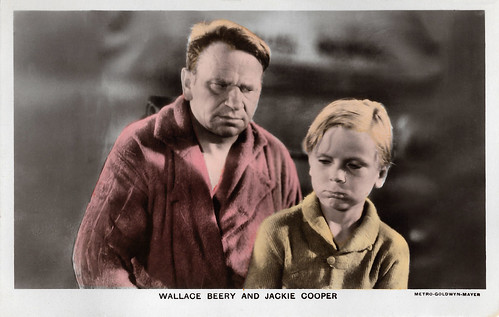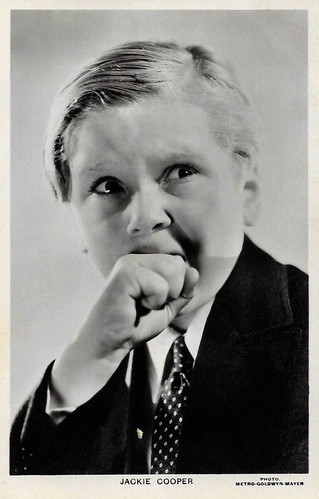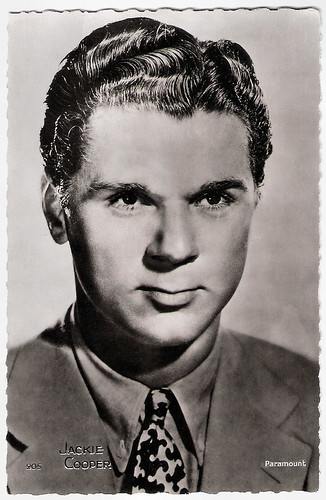American actor, television director, producer, and executive Jackie Cooper (1922-2011) was one of the most popular child stars of the 1930s. He was endearing to audiences with his ability to make them laugh or cry. Jackie is also the youngest performer to have been nominated for an Oscar for Best Actor in a Leading Role, for Skippy (1931). He was one of the few child actors who managed to make the transition to an adult career. In later life, he produced and directed over 250 films and television shows.

Dutch postcard by J.S.A., no. 184. Photo: Metro-Goldwyn-Mayer. Jackie Cooper in The Champ (King Vidor, 1931). Sent by mail in 1932.

Dutch postcard, no. 175. Photo: Metro-Goldwyn-Mayer. Jackie Cooper in The Champ (King Vidor, 1931).

Dutch postcard, no. 152. Photo: Metro-Goldwyn-Mayer. Jackie Cooper in The Champ (King Vidor, 1931).

Dutch postcard, no. 1235. Photo: Paramount. Jackie Cooper in Skippy (Norman Taurog, 1931).

Dutch postcard, no. 309. Photo: Metro-Goldwyn-Mayer. Jackie Cooper in Skippy (Norman Taurog, 1931).
One of Our Gang's major characters
Jackie Cooper was born as John Cooper Jr. in 1922 in Los Angeles, California. Cooper's father, John Cooper, left the family when Jackie was 2 years old. The two never reunited after he had left the family. His mother, Mabel Leonard Bigelow (née Polito), was a stage pianist. Cooper's maternal uncle, Jack Leonard, was a screenwriter and his maternal aunt, Julie Leonard, was an actress married to director Norman Taurog. Cooper's stepfather was C.J. Bigelow, a studio production manager.
Cooper first appeared in films as an extra with his grandmother, who took him to her auditions hoping it would help her get extra work. At age 3, Jackie appeared in Bobby Clark and Lloyd Hamilton comedies under the name of 'Leonard'. Cooper graduated to bit parts in feature films such as Fox Movietone Follies of 1929 (David Butler, 1929) and Sunny Side Up (David Butler, 1929) with Janet Gaynor.
His director in those films, David Butler, recommended Cooper to director Leo McCarey, who arranged an audition for the Our Gang comedy series produced by Hal Roach. In 1929, Cooper signed a three-year contract after joining the series in the short Boxing Gloves (Robert A. McGowan, 1929). He initially was to be a supporting character in the series, but by early 1930 his success in transitioning to sound films enabled him to become one of Our Gang's major characters. He appeared in 15 shorts over the next two years.
He was the main character in the episodes The First Seven Years (Robert A. McGowan, 1930) and When the Wind Blows (James W. Horne, 1930). His most notable Our Gang shorts explore his crush on Miss Crabtree, the schoolteacher played by June Marlowe: Teacher's Pet (Robert A. McGowan, 1930), School's Out (Robert A. McGowan, 1930), and Love Business (Robert A. McGowan, 1930).
In 1931, while under contract to Hal Roach Studios, Jackie Cooper was loaned to Paramount to star in Skippy (1931), directed by his uncle, Norman Taurog. At age 9, Cooper was nominated for an Academy Award for Best Actor, the youngest actor to be nominated for such an Oscar. Although Paramount paid Roach $25,000 for Cooper's services, Roach paid Cooper a standard salary of $50 per week.
Our Gang producer Hal Roach sold Jackie's contract to Metro-Goldwyn-Mayer in 1931. Cooper acted with Wallace Beery in The Champ (King Vidor, 1931), The Bowery (Raoul Walsh, 1933), Treasure Island (Victor Fleming, 1934), and O'Shaughnessy's Boy (Richard Boleslawski, 1935). In his autobiography, Cooper wrote that Beery was a disappointment and accused him of upstaging him and attempting to undermine his performances out of jealousy.
Cooper outgrew his preteen cuteness by the late 1930s and was forced to accept whatever work that came along. he enjoyed the occasional plum role in such films as The Return of Frank James (Fritz Lang, 1940) with Henry Fonda, and the first two Henry Aldrich films, What a Life (Theodore Reed, 1939) and Life with Henry (Theodore Reed, 1941). Cooper served in the U.S. Navy during World War II, remaining in the reserves until 1982, retiring at the rank of captain and receiving the Legion of Merit.

German postcard by Ross Verlag, no. 161/3. Photo: Metro-Goldwyn-Mayer Jackie Cooper in The Champ (King Vidor, 1931).

German postcard by Ross Verlag, no. 6701/1, 1931-1932. Photo: Paramount. Jackie Cooper and Mitzi Green in Skippy (Norman Taurog, 1931).

German postcard by Ross Verlag, no. 6902/1, 1931-1932. Photo: Metro-Goldwyn-Mayer.

Dutch postcard. Sent by mail in 1938. Photo: Jackie Cooper in Skippy (Norman Taurog, 1931). Caption: What has happened now. That he looks so angry at everyone.

Dutch postcard. Sent by mail in 1938. Photo: Jackie Cooper in Skippy (Norman Taurog, 1931). Caption: It's Mum's birthday... wait a second ... Think, what will I give her.
Please Don't Shoot My Dog
After the war, Jackie Cooper was cast in a stage production of 'Mr. Roberts' (1950) in Boston, Massachusetts in the role of Ensign Pulver. In 1954, he guest-starred on TV in the legal drama Justice. He starred in two television sitcoms, The People's Choice (1955-1958) with Patricia Breslin and Hennesey (1959-1962) with Abby Dalton.
From 1964 to 1969, Cooper was vice president of program development at Columbia Pictures Screen Gems TV division. He was responsible for packaging series such as Bewitched and selling them to the networks. In 1964, Cooper appeared in Rod Serling's The Twilight Zone episode Caesar and Me, and in the made-for-television film Shadow on the Land (Richard C. Sarafian, 1968). Cooper left Columbia in 1969.
He appeared in the fourth season of Hawaii Five-O in an episode called The Burning Ice (1971), in Candidate for Crime (1973) starring Peter Falk as Columbo, and in the series Mobile One (1975). Cooper’s work as director on episodes of M*A*S*H and The White Shadow earned him Emmy awards.
In the 1970s and 1980s, Cooper appeared as Daily Planet editor Perry White in the Superman film series, Superman (Richard Donner, 1978), Superman II (Richard Lester, 1980), Superman III (Richard Lester, 1983), and Superman IV: The Quest for Peace (Sidney J. Furie, 1987). He got the role after Keenan Wynn, who was originally cast as White, became unavailable after suffering a heart attack.
Cooper's final film role was as Ace Morgan in Surrender (Jerry Belson, 1987), starring Sally Field, Michael Caine, and Steve Guttenberg. Cooper announced his retirement in 1989, although he continued directing episodes of the syndicated series Superboy. He began spending more time training and racing horses at Hollywood Park and outside San Diego during the Del Mar racing season. Cooper lived in Beverly Hills from 1955 until his death.
Cooper's autobiography, 'Please Don't Shoot My Dog', was published in 1982. The title refers to an incident during the filming of Skippy, when Norman Taurog, who was directing Cooper in a crying scene, ordered a security guard to take away his dog and pretend to shoot him backstage. The stunt resulted in genuine tears; however, even upon discovering his dog was fine, Cooper was left with ill feelings toward his uncle.
For his contributions to the motion picture industry, Cooper was honored with a Hollywood Walk of Fame star located at 1507 Vine Street. Cooper died in 2011 from natural causes, in Santa Monica, California. He was survived by his two sons. He was interred at Arlington National Cemetery in Arlington, Virginia, in honor of his naval service.
Jackie Cooper was married to June Horne from 1944 until 1949, with whom he had a son, John 'Jack' Cooper, III (1946). June was the daughter of director James W. Horne and actress Cleo Ridgely. Cooper was married to Hildy Parks from 1950 until 1951 or 1954 (sources differ), and to Barbara Rae Kraus from 1954 until her death in 2009. Cooper and Kraus had three children, Russell (1956), Julie (1957-1997), and Cristina (1959-2009).

British postcard in the Film Partners Series, London, no. PC 71. Photo: Metro-Goldwyn-Mayer (MGM). Wallace Beery and Jackie Cooper in The Champ (King Vidor, 1931).

British postcard in the Film-Kurier Series, London, no. 11. Photo: Metro-Goldwyn-Mayer.

French postcard by Cinémagazine-Edition, no. 1017. Photo: Metro-Goldwyn-Mayer. Jackie Cooper in The Champ (King Vidor, 1931).

British postcard in the Picturegoer Series, London, no. 568a. Photo: Metro-Goldwyn-Mayer. Jackie Cooper in The Champ (King Vidor, 1931).

British postcard in the Film Partners Series, London, no. P 71. Photo: Metro-Goldwyn-Mayer (MGM). Wallace Beery and Jackie Cooper in The Champ (King Vidor, 1931).

British postcard by Film Weekly. Photo: 20th Century / United Artists. Wallace Beery and Jackie Cooper in The Bowery (Raoul Walsh, 1933).

British postcard by De Reszke Cigarettes, no. 46. Photo: Metro-Goldwyn-Mayer (MGM). Wallace Beery and Jackie Cooper in Treasure Island (Victor Fleming, 1934).

French postcard by Editions P.I., Paris, no. 205. Photo: Paramount.
Sources: Hal Erickson (AllMovie), Find A Grave, Wikipedia, and IMDb.
No comments:
Post a Comment